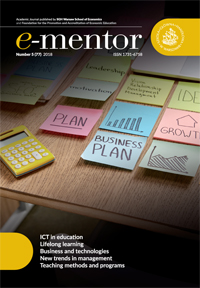Adaptive Learning: Context and Complexity
Adaptive Learning: Context and Complexity
Author(s): Charles Dziuban, Colm Howlin, Patsy D. Moskal, Connie Johnson, Mitchell Eid, Brandon KmetzSubject(s): Adult Education, Higher Education
Published by: Szkoła Główna Handlowa w Warszawie, Fundacja Promocji i Akredytacji Kierunków Ekonomicznych
Keywords: online courses; academic achievement; adaptive learning; blended learning; digital learning; college students; educational strategies
Summary/Abstract: Adaptive learning technologies impact higher education by modifying the traditional time constraints placed on the learningcycle, thus permitting students to compress or expand their learning spaces. Previous work by the authors has demonstrated dimensional stability in the adaptive process across universities with considerably different strategic initiatives. However, a prevailingquestion remains about the correspondence of student position on those components. Transformed component scores for the fourstable dimensions (knowledge acquisition, engagement, growth and communication) have been contrasted for comparability inbeginning Algebra, College Algebra and Nursing courses at the University of Central Florida and the Colorado Technical University on several metrics generated by the Realizeit adaptive learning platform. The results indicated considerable variability instudent affinity for the underlying dimensions depending on a number of considerations such as course length, subject area, andthe instructional design process. The authors have concluded that adaptive learning is a complex system in which the interactionof the elements becomes more important than individual measures for understanding the emergent property of this learningenvironment. Finally, they contend that the potential value added of adaptive learning must be carefully considered with respectto its opportunity cost.
Journal: e-mentor
- Issue Year: 77/2018
- Issue No: 5
- Page Range: 13-23
- Page Count: 11
- Language: English

